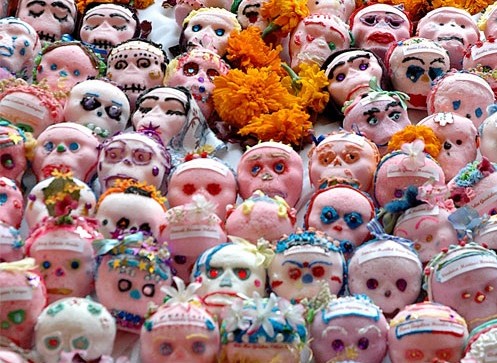
Visiting the dead is a common ritual for Mexicans during El Dia De Los Muertos. But South Bronx Mexicans won’t be spending time at tombstones next week – for the simple fact that most of them don’t bury their loved ones in the United States. Instead, they send the deceased back to rest in their homeland.
“I don’t know one Mexican family that has purchased a burial plot in the area,” said Rev. John Grange of St. Luke’s church on East 138th Street in Mott Haven.
For the past two decades, Mexicans have been an important growing immigrant group of the South Bronx.
According to the Census Bureau, in 2005, Mexicans composed close to 30 percent of the South Bronx Hispanic population. Today, St. Jerome’s Church on Alexander Avenue has a congregation that is more than 80 percent Mexican. Yet, after having served 33 years as a priest there, Grange has never officiated a single Mexican funeral.
“The first thing my Irish grandparents did when they arrived in Mott Haven was buy a grave. That’s not the case for the Mexicans. Their plan isn’t to stay here permanently,” said Grange.
This particular trend has carved a niche for funeral homes. The R.G. Ortiz funeral home chain has won clients by catering to this clientele: transporting the dead from anywhere in the New York area to final resting places in Mexico.
While it is not uncommon for other immigrant groups to ship bodies back home, Mauro Calderón, manager of R.G. Ortiz on Willis Avenue said Mexicans are the most committed. While about half of Dominicans and Ecuadoreans want bodies shipped back, more than 90 percent of Mexicans follow this ritual.
“It’s tradition. Everyone has to go back to the homeland. Even the dead. The cost is significant, but Mexicans will do whatever it takes to find the money,” Calderón said.
For about $3,000, about a third of the price of a funeral in the New York area, R.G. Ortiz offers a wake and handles the paperwork required to repatriate bodies. While other Consulates like those of Ecuador and the Dominican Republic usually charge a permit fee of about $200, the Mexican Consulate covers the fee, and depending on the situation, may also pay for the entire funeral service.
“Repatriating bodies is such a large expense and it used to be that people extorted their savings. Being buried in Mexico is so important to them that they would rather get in debt than not respect the tradition. So, we have worked out agreements with several funeral homes in the New York area so that we can help,” said Julio Garcia, Press Officer at the Mexican Consulate.
Abroad, Mexicans help one another to find ways to pay for the repatriation of loved-ones. They’ll ask for donation, go door-to-door, or use coperachas or tandas – a weekly collected pot of money that is shared with everyone, as a way to pull money. As a Mexican immigrant living in Mott Haven, Carman Escamilla has contributed to helping others send back bodies to Puebla and Oaxaca.
“We might not know each other but we trust one another. We’re all illegal. At the end of the day, we all hope to go back to Mexico, that’s why we support each other.” said Escamilla.
More than just an expensive ritual, funerals are a week-long process in Mexico and as Mexicans work and fight for their immigration status in America; they simply cannot tend to traditions.
“In Mexico, the wake will last a nine days. They’ll sing, they’ll pray, they’ll eat tamales, pipián and make altars in commemoration of the dead. Over here, it will only last a day,” Grange said.
Over here, Mexicans cannot celebrate their dead in the same way. There’s no room in an apartment where more than one family lives, there’s no time off work and it’s just too expensive.
“We come here to work hard and make money so we can eventually go back to Mexico and live a better life,” said Escamilla.
Claudia Hoyos is a Mexican immigrant who owns a small bakery on 149th street. As she set out el pan de los muertos – the holiday bread eaten on November 1st – on the counter display, she sang an old Mexican song.
“Mexico lindo y querido. Ay! De mi si muera, fuera de ti.” (My beautiful and beloved Mexico. I will not die without you).
